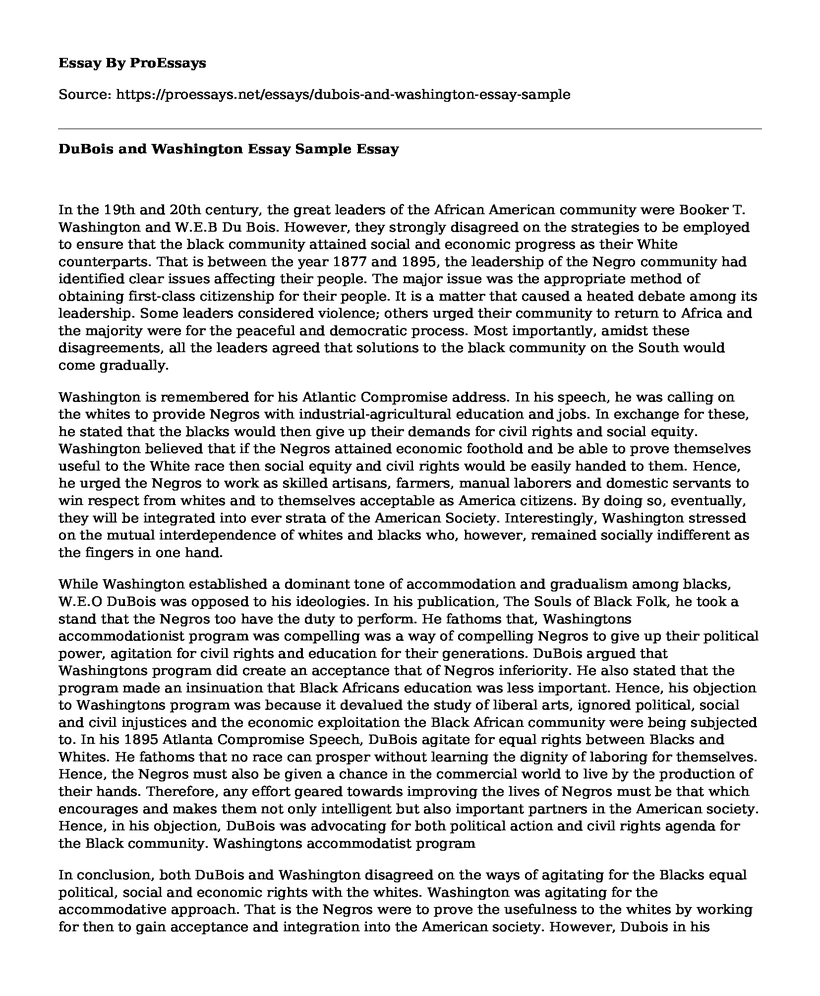In the 19th and 20th century, the great leaders of the African American community were Booker T. Washington and W.E.B Du Bois. However, they strongly disagreed on the strategies to be employed to ensure that the black community attained social and economic progress as their White counterparts. That is between the year 1877 and 1895, the leadership of the Negro community had identified clear issues affecting their people. The major issue was the appropriate method of obtaining first-class citizenship for their people. It is a matter that caused a heated debate among its leadership. Some leaders considered violence; others urged their community to return to Africa and the majority were for the peaceful and democratic process. Most importantly, amidst these disagreements, all the leaders agreed that solutions to the black community on the South would come gradually.
Washington is remembered for his Atlantic Compromise address. In his speech, he was calling on the whites to provide Negros with industrial-agricultural education and jobs. In exchange for these, he stated that the blacks would then give up their demands for civil rights and social equity. Washington believed that if the Negros attained economic foothold and be able to prove themselves useful to the White race then social equity and civil rights would be easily handed to them. Hence, he urged the Negros to work as skilled artisans, farmers, manual laborers and domestic servants to win respect from whites and to themselves acceptable as America citizens. By doing so, eventually, they will be integrated into ever strata of the American Society. Interestingly, Washington stressed on the mutual interdependence of whites and blacks who, however, remained socially indifferent as the fingers in one hand.
While Washington established a dominant tone of accommodation and gradualism among blacks, W.E.O DuBois was opposed to his ideologies. In his publication, The Souls of Black Folk, he took a stand that the Negros too have the duty to perform. He fathoms that, Washingtons accommodationist program was compelling was a way of compelling Negros to give up their political power, agitation for civil rights and education for their generations. DuBois argued that Washingtons program did create an acceptance that of Negros inferiority. He also stated that the program made an insinuation that Black Africans education was less important. Hence, his objection to Washingtons program was because it devalued the study of liberal arts, ignored political, social and civil injustices and the economic exploitation the Black African community were being subjected to. In his 1895 Atlanta Compromise Speech, DuBois agitate for equal rights between Blacks and Whites. He fathoms that no race can prosper without learning the dignity of laboring for themselves. Hence, the Negros must also be given a chance in the commercial world to live by the production of their hands. Therefore, any effort geared towards improving the lives of Negros must be that which encourages and makes them not only intelligent but also important partners in the American society. Hence, in his objection, DuBois was advocating for both political action and civil rights agenda for the Black community. Washingtons accommodatist program
In conclusion, both DuBois and Washington disagreed on the ways of agitating for the Blacks equal political, social and economic rights with the whites. Washington was agitating for the accommodative approach. That is the Negros were to prove the usefulness to the whites by working for then to gain acceptance and integration into the American society. However, Dubois in his objection stated that Washingtons approach assumed that Negros were inferior and that such program meant that the Negros were giving up their powers and the calls for equal rights.
Cite this page
DuBois and Washington Essay Sample. (2021, Mar 24). Retrieved from https://proessays.net/essays/dubois-and-washington-essay-sample
If you are the original author of this essay and no longer wish to have it published on the ProEssays website, please click below to request its removal:
- Research Paper on Sport Marketing and the Popularity of Social Networking Sites
- The Abolition of Slavery: Its Impact on America's Rise - Interview Example
- Essay Example on One Tweet, One Life: Jon Ronson and Justine Sacco's Story
- Paper Example on Rafe & Danny: Best Friends in War-Torn Times
- Tuskegee Experiment: A Controversial Study of Research Ethics - Essay Sample
- Paper Example on Analysing Literary Devices in Ann Petry's Bones of Louella Brown
- Slavery - Free Essay Sample







